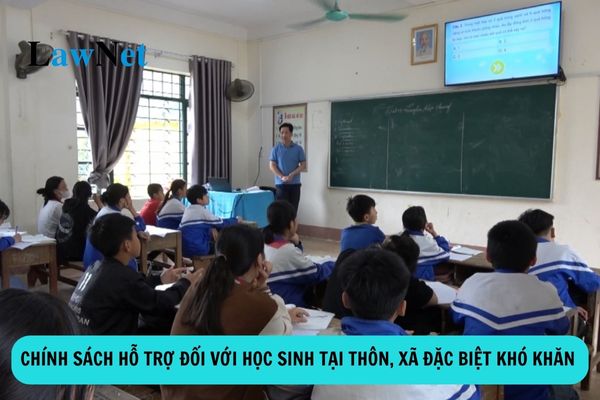Policies on Support for Students in Particularly Difficult Villages and Communes in Vietnam
What are policies on support for students in particularly difficult villages and communes in Vietnam?
According to Clause 1, Article 5 of Decree 116/2016/ND-CP, students in particularly difficult villages and communes are supported with food, housing, and rice with the following support levels:
- Food support: Each student is supported monthly with an amount equivalent to 40% of the statutory pay rate, and the support is provided for no more than 9 months per school year per student.
- Housing support: For students who have to arrange their own accommodation because the school cannot provide boarding, each month they are supported with an amount equivalent to 10% of the statutory pay rate, and the support is provided for no more than 9 months per school year per student.
- Rice support: Each student is supported with 15 kg of rice per month, and the support is provided for no more than 9 months per school year per student.

What are policies on support for students in particularly difficult villages and communes in Vietnam? (Image from Internet)
What are the conditions for students in particularly difficult villages and communes in Vietnam to benefit from the support policies?
According to Article 4 of Decree 116/2016/ND-CP, the conditions for students in particularly difficult villages and communes to benefit from the support policies are as follows:
(1). For primary and lower secondary school students, one of the following conditions must be met:
- Are semi-boarding students attending ethnic minority semi-boarding schools;
- Are students whose family and themselves have permanent residence registration in particularly difficult communes or villages attending primary or lower secondary schools in Region III areas, particularly difficult villages in ethnic and mountainous regions; particularly difficult coastal and island communes.
Living far from school with a distance of 4 km or more for primary school students and 7 km or more for lower secondary school students, or with difficult terrain and transportation: having to cross rivers and streams without bridges; crossing high mountains; crossing landslide areas;
- Are students whose family and themselves have permanent residence registration in Region III areas or particularly difficult villages in ethnic and mountainous regions attending primary or lower secondary schools in Region II areas in ethnic and mountainous regions. Living far from school or with difficult terrain and transportation as specified at Point b, Clause 1, Article 4 of Decree 116/2016/ND-CP.
(2). For upper secondary school students who are ethnic minorities, the following conditions must be met: (*)
- Attending upper secondary school or the upper secondary school level in multi-level schools;
- Their family and themselves have permanent residence registration in Region III areas, particularly difficult villages in ethnic and mountainous regions; particularly difficult coastal and island communes.
Living far from school with a distance of 10 km or more or with difficult terrain and transportation: having to cross rivers and streams without bridges; crossing high mountains; crossing landslide areas.
(3). For upper secondary school students who are Kinh ethnic people, in addition to the conditions at (*), they must also be household members of a poor family.
What documents are required for support policies for students in particularly difficult villages and communes in Vietnam?
According to Article 6 of Decree 116/2016/ND-CP (amended by Clauses 1, 2, and 3, Article 3 of Decree 104/2022/ND-CP), the documents required for support policies for students in particularly difficult villages and communes include:
(1). For primary and lower secondary school students attending schools in particularly difficult communes and villages, the documents include:
- A support request form (for primary school students, use Form No. 01; for lower secondary school students, use Form No. 02 in the Appendix attached to Decree 116/2016/ND-CP).
- Submit a copy of one of the following documents: Citizen Identification Card, Identity Card, Residence Information Certification, Notification of personal identification number, and citizen information in the National Database on Population in case the agency or organization cannot extract citizen residence information from the National Database on Population.
(2). For upper secondary school students who are ethnic minorities, the documents include:
- A support request form (Form No. 02 in the Appendix attached to Decree 116/2016/ND-CP);
- Submit a copy of one of the following documents: Citizen Identification Card, Identity Card, Residence Information Certification, Notification of personal identification number, and citizen information in the National Database on Population in case the agency or organization cannot extract citizen residence information from the National Database on Population.
(3). For upper secondary school students who are Kinh ethnic people, the documents include:
- A support request form (Form No. 02 in the Appendix attached to Decree 116/2016/ND-CP);
- Submit a copy of one of the following documents: Citizen Identification Card, Identity Card, Residence Information Certification, Notification of personal identification number, and citizen information in the National Database on Population in case the agency or organization cannot extract citizen residence information from the National Database on Population.
- Documents proving that the family is poor, issued or certified by the commune-level People's Committee, or other relevant agencies.

